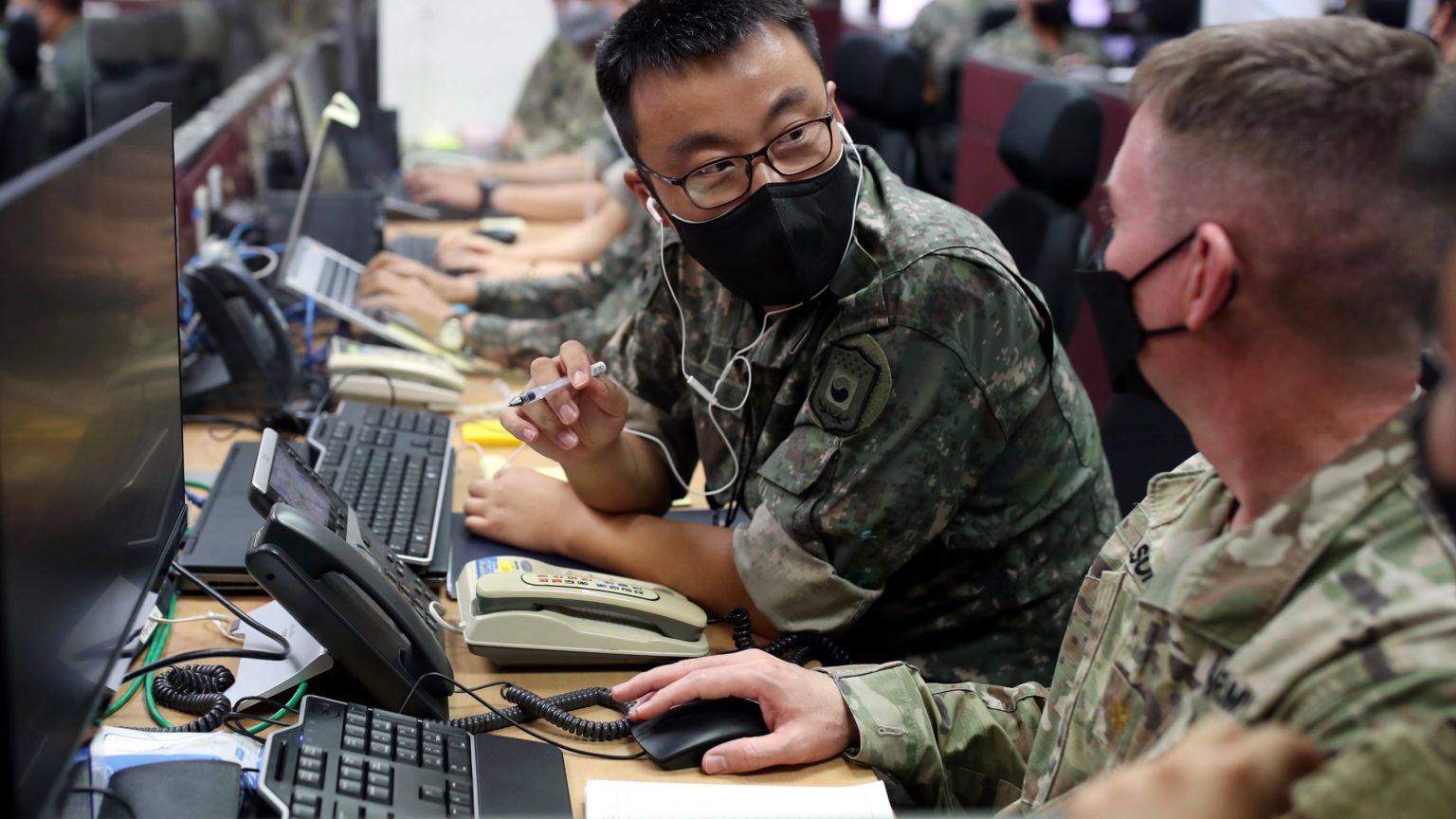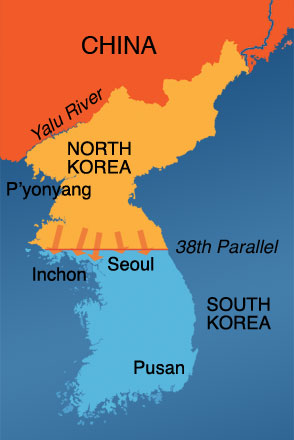The resumption of the recent joint military exercises is viewed with alarm by China, which, like North Korea, has repeatedly pointed to U.S. attempts to set up a NATO-like organization in Asia, writes Aditya Sarin.

Participants in the joint U.S.-South Korean exercises in the Pacific, Aug. 22. (South Korea Ministry of Defense)
By Aditya Sarin
Peoples Dispatch
Between Aug. 22 and Sept. 1, the United States and South Korea concluded their largest joint military drills in the Korean Peninsula since 2017, under the name “Ulchi Freedom Shield.” Over the last four years, the scope of the annual exercises had been scaled back, first because of former U.S. President Donald Trump’s attempts at diplomacy with North Korea’s Kim Jong-un and later because of the Covid-19 pandemic.
With these drills, however, the U.S. and South Korea seem to be attempting to send a clear message to both North Korea and China of their united military posture in the region, and come at a time when the U.S.’ encirclement of China continues rapidly.
The U.S. has maintained a force of at least tens of thousands of troops in South Korea (officially the Republic of Korea, or ROK), since before the Korean War. While South Korean forces are otherwise independent, at times of war they are subordinated to the command of a U.S. general as part of the ROK/US Combined Forces Command. With 28,500 U.S. troops stationed there, South Korea has the third-highest number of U.S. troops of any country outside of the U.S.
Donate Today to CN’s 2022 Fall Fund Drive
While the recent exercises have been conducted against a nameless enemy, it is not hard to see towards whom their message is aimed. The site of the exercises was only 32 kilometers from the border and De-Militarized Zone (DMZ) between North and South Korea. Live-fire tank and troop maneuvers have been practiced as the U.S. and the ROK engage in simulations and seek to increase interoperability of their deployments and technologies.
War-gamed attempts to seize “weapons of mass destruction” and mount a defense of Seoul suggest that they are preparations for potential conflict with North Korea.
North Korea’s Nuclear Program

Map of Korean Peninsula showing the 38th Parallel where the DMZ was established in 1953. (Wikipedia)
Trump’s attempts to seek a diplomatic end to the North Korean nuclear program were unsuccessful, as have been the U.S. economic sanctions and blockades. These exercises must be seen as a continuing show of force towards the same chief end.
As part of his campaign and even more recently, new South Korean Premier Yoon Suk-yeol has touted his willingness to engage in “decapitation strikes” against the North Korean leadership, as part of a broader turn towards support for, and from, U.S. interests in the region.
He has also more recently offered a bouquet of economic enticements for North Korea to abandon its nuclear program, an offer that was rejected out of hand by Kim Jong-un’s sister Kim Yo-jong, who pointed out that it was merely the restatement of a similar offer that had been made and dismissed in the past.
The North sees its nuclear arsenal as non-negotiable and the key to its global legitimacy, and is no doubt also aware of what has happened to other countries such as Libya and Iran that have agreed to put holds on their military nuclear capabilities at the behest of the U.S.
With U.S. bases and troops having been positioned so close to its border for almost its entire existence as a country, it is easy to understand why North Korea does not see a reduction in its military capabilities as a particularly pressing or, indeed, sensible priority.
The resumption of these joint military exercises has also been viewed with alarm by China, which, like North Korea, has repeatedly pointed to U.S. attempts to set up a NATO-like organization in Asia.
As tensions in the region reached unprecedented levels recently following U.S. politician Nancy Pelosi’s provocative visit to Taiwan, it seems that U.S. military presence in the region is only likely to increase in the near future.
South Korea and the U.S. also recently participated in trilateral military exercises with Japan near Hawai’i, signaling what might be a new low in [South Korean-Japanese] hostilities that trace their roots to the Japanese occupation of Korea which only ended in 1945 when the administration of South Korea was handed over briefly to the U.S. This too has been noted with concern by China, and suggests that the U.S. is coordinating its allies in the region as it attempts to extend its global hegemony ever-further eastward.
Aditya Sarin is a correspondent for Peoples Dispatch.
This article is from Peoples Dispatch.
Donate Today to CN’s
2022 Fall Fund Drive
Donate securely by credit card or check by clicking the red button:

The are many malefactors in our world, but the U.S. is leading the bellicose way. Shortly after WWII George Kennan proclaimed we would have to protect our perch on top of the world and keep any nation from challenging us. Kissinger followed with Nixon, Wolfowitz followed with one, or both of the Bushes (and did despicable bulling is South and Central America), Brzezinski follows with Carter – all said and supported American hegemony backed by nuclear weapons. I don’t even include Reagan.
This is a rather terrible revelation, IMO. It needs to be faced.
Look I am no fan of the US for a variety of reasons including its many interventions around the world against elected ( often left wing) governments, it’s claims of exceptionalism and being the best country in the world ( it isn’t for many many reasons) and it’s claims to be a democracy. However this article pushes things a bit too far. North Korea is run by a mad megalomaniac whose finger we definitely don’t want near a nuclear button while China routinely demonstrates its contempt for international law with its provocative base-building in the South China Sea, its use of economic power, for example bans on Australian imports, to reflect displeasure at what it sees as negative comments, and it’s recent very provocative exercises around Taiwan and Japan need some reaction. If countries like Japan, South Korea, the US and Australia don’t react to such provocations China will continue its already considerable march into the Pacific and not with benign intent.
It is quite clear that the United States of America is firmly opposed to Peace anywhere in the world.
If a place in this world is not at war, the Americans ask ‘why the #%$% not?’ (in their kind and subtle matter.)
The American government policy, both at home and abroad, can best be summed up by the phrase “Die, m@#$%#-@#$%@s, Die.”
Joe Biden has got to be setting records for the number of Dead Americans during his time. He’s racked up hundreds of thousands (plus more uncounted) from COVID, now he is doing the same with MonkeyPox and bringing back Polio to America. After all, we can’t waste money on Public Health, not in a time of war. National Security certainly does not include the health of citizens. All while telling Americans that they have to freeze and starve this winter in order to support the war, death and destruction in Ukraine. Plus, he wants more wars in Iran, China and North Korea. It is quite clear that America won’t be happy until a vast swath of the world’s people, including Americans, are dead.
“Die, m@#$%#-@#$%@s, Die.” — Joe Biden, I did that.
Agree totally. The USA is the ultimate ‘state sponsor of terrorism’, the most destructive force on the planet. It is time that its citizens woke up and took action if they want a country and planet for their children.
It is a bipartisan affair.
As I understand it, the US engages in provocative military exercises close to N Korea every autumn around harvest time, because NK military has a high number of reservists that have to be called up and made ready to defend their country from a US invasion. Men that would otherwise be needed in the fields. In other words, an unsubtle move to disrupt the food supply in NK.